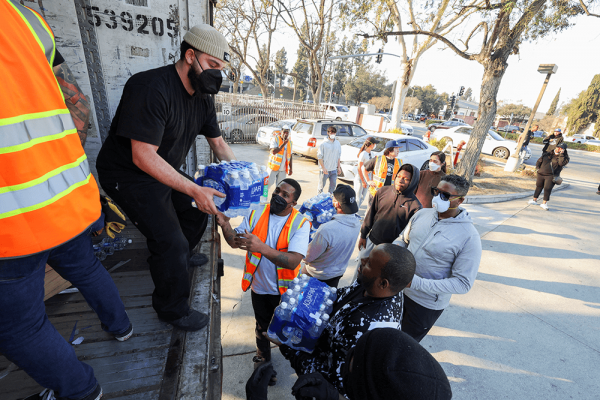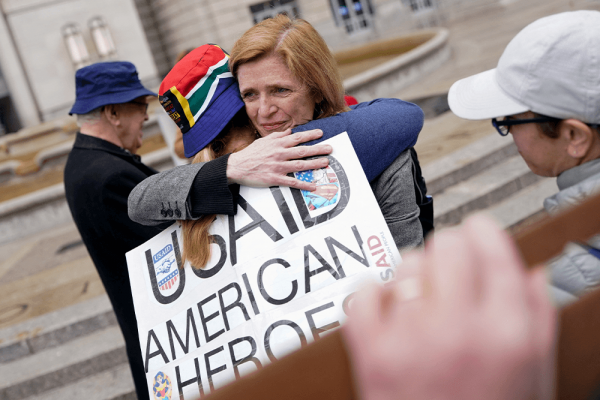One-in-12 Christians in the world today experience high to extreme persecution for their faith, according to a new report. Many of the most vulnerable are women.
Open Doors USA, a ministry that works with persecuted Christians around the world, released its 25th annual World Watch List at the National Press Club Wednesday in Washington, D.C. The list, a compilation of field interviews and aggregated data from other agencies, ranks the 50 most dangerous countries in the world for Christians. Dangers include religious militancy, organized corruption, and Islamic extremism, among other factors. (Read the full report here.)
Open Doors president and CEO David Curry says religious persecution has risen in the last year in 30 countries on the list.
“There is a rise in persecutions of Christians in every region of the world,” Curry told Sojourners.
The 2018 report was introduced by Congressman Robert Aderholt (R-Ala.), who said the list was “widely recognized” as an important indicator of religious freedoms around the world, and regularly used by members of Congress and the State Department.
Christian persecution is particularly high in religion-hostile countries like North Korea, and in countries with a strong presence of Islamic extremism, from Pakistan to Somalia. While North Korea has topped the rankings for 16 years, Syria — previously ranked the sixth most dangerous country for Christians in the world — was absent from the top 10 countries in 2018.
“Syria dropped this year because of the withdrawal of ISIS and their targeting of Christians … and because many Christians have left Syria,” Curry said. “Those dynamics, from civil war and other factors, will cause a change in the rankings.”
The list also recorded reports from 2,260 women who were raped, sexually harassed, or forced into marriage under threat of death through religious pressure. The authors caveat that this figure only covers those who spoke up.
“We think that crimes against women are generally underreported,” Kristina Arriaga, vice chairwoman at the United States Commission on International Religious Freedom, said.
“In countries where there’s no religious freedom, generally you also have very poor protection of rights for women. In a country where there’s no religious freedom, a woman has to marry within her own religion — if a woman converts, more than likely she is either going to face divorce or she is going to have to give up custody of her children. In a country where there’s no religious freedom, you have to obey your father or your husband.”
Benita, a Christian Indian woman at the press release, said she had witnessed Christian women’s particular vulnerability in her society.
“In India, Christian women are highly dependent on men,” Benita said. “Each woman is very much in fear…if anything happens to men, then we don’t know what will happen.
Benita spoke of informal social networks as sources of resiliency for Christian women in India.
“They are standing firm in their faith. If the husband went to jail, she would take care of the congregation. They are sharing the gospel silently,” she said.
In 2015, the United States Commission on International Religious Freedom began focusing on the intersection of religious freedom and women’s rights. Arriaga noted a particular regard to female genital mutilation.
“There’s not a single religious text in the world that protects female genital mutilation. But in Christian communities in Egypt, and in many African countries, you have female genital mutilation being performed as a matter of a rite of purity…or being excused by the government as a matter of religious freedom. That is an extraordinarily disturbing religious trend.”
In the first reported case of female genital mutilation in the United States, in July 2017, the defense claimed it was a protected religious practice.
“That is a cynical, cynical view of religious freedom,” Arriaga said. “And whatever happens in this country informs processes in other countries. So I’m hoping we will not allow this to happen, because it will certainly have international impact.”
The United States’ international leadership on questions of religious freedom is under scrutiny in 2018, as the Trump administration struggles to signal a consistent approach to international engagement.
“A lot of these countries are countries that we have billion-dollar agreements with. I think it’s important to know, when we are sending taxpayer dollars to some of these countries, that we know what is going on, and call attention to it,” Rep. Aderholt said in his opening remarks.
Curry agreed, citing a bipartisan approach to international religious freedom.
“The Trump administration has drawn attention to what’s going on with persecuted Christians, particularly [on the part of] Vice President Pence, and we want to give them credit for that,” Curry said.
“We also have challenges with how things are done — and the understanding that whatever this administration says will be taken by extremists as a coalition with Christians. And we see an attack and increased pressure on Christians.”
One unanswered question is the peculiar position of Sam Brownback, outgoing governor of Kansas, whose nomination to the position of U.S. ambassador-at-large for international religious freedom has not yet been confirmed by the Senate. The position has now been vacant for more than a year.
“This position is critical to raising awareness and to synthesizing the efforts of the United States government around religious freedom and, in our particular interests, for supporting persecuting Christians,” Curry said.
“We hope that the Senate and others will move on this quickly.”
Got something to say about what you're reading? We value your feedback!







